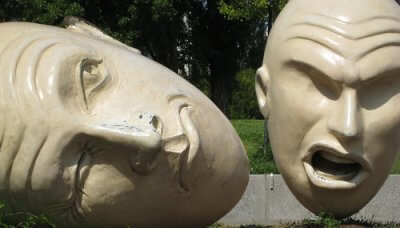Attention-Seeking Behaviour – Guiltier Than You Realise?
by Andrea M. Darcy
Have you been accused of attention-seeking behaviour? What might this look like, why would you do it, and what can be done to turn a need for attention into something more beneficial?
Editor and lead writer Andrea Blundell addresses this important issue.
What is attention-seeking behaviour?
Some kinds of attention seeking are more obvious than others.
For example, there are the more talked-about ones that start when we are children or teens. They can include things like:
- telling big dramatic stories
- being the ‘class clown’
- showing off
- bad behaviour and acting out
- temper tantrums
- showing off
- dressing and acting in ways just to prove we are different and unique
- promiscuity – using flirting or sexual innuendo to gain attention.
But many kinds of attention seeking are to do with communication and far more subtle ways of having someone’s focus.
Attention-seeking communication can also look like:
- criticising
- complaining
- tell stories or jokes that make someone else look bad
- gossip
- talking to much, or about ourselves only
- exaggerating
- oversharing
- one-upping
- challenging everything someone else says.
And other forms of attention-seeking behaviour that are ways of manipulating the other to give you their energy include:
- acting helpless
- playing the victim
- fishing for compliments
- changing your personality and viewpoint to match who you are around
- agreeing with everything someone says
- being angry.
Why would anger be a way to get attention?

By: Phil Whitehouse
Surprised to see anger on the above list?
Yes, recently mental health has become something we talk about more in countries like the U.K. But there is still a strong culture of seeming ‘strong’ and ‘together’.
We aren’t, however, exactly encouraged to walk around asking for positive attention, or admitting we need to feel a bit loved today. Instead, for many of us, it feels shameful to admit we want attention.
But what is somehow culturally acceptable is to snap at a partner, or pick on them, or even, yes, get angry about something.
Which is all a way to get attention, albeit not of the positive variety.
Imagine that you come home and you want to tell your partner all about your work win, but they are playing a video game. You ask them how they are, hoping they ask back. They don’t. Next thing you are snapping at them for being lazy and not cleaning the house but gaming, they snap at you for nagging, and soon it’s a full blown argument about all sorts. You got attention after all!
Why would I be using attention-seeking behaviours?
Sometimes it’s that we learned that this was an effective way to run our relationships from the adults around us growing up, and have continued the pattern.
But more often, it’s connected to psychological issues. The classic one we all state here is low self-esteem.
Yet it’s often more convoluted than just low self-worth. It can also be that we:
- are codependent and need approval to feel worthy
- lack identity and find it through other’s view on us
- suffer from feelings of loneliness and disconnection.
But how did we end up so lacking in identity, confidence, and connection?
The roots of attention-seeking behaviours

By: Donnie Ray Jones
Childhood trauma and adverse childhood experiences (ACEs) can leave us believing we don’t deserve love. Sexual abuse, neglect, a mentally unwell parent or violent household…. it can all leave us believing we have to earn any attention we get.
Or it might be that you had a parent who was simply unable to offer you the unconditional love and attention a child deserves. Perhaps they were mentally or emotionally unavailable, or had a tendency to only show you love if you behaved a certain way. This can see you have attachment issues as an adult, where you try to win attention or push and pull.
It is also possible that attention-seeking behaviour is caused by a personality disorder which means you see and experience the world differently than others. Histrionic personality disorder involves dramatic and promiscuous behaviour. Borderline personality disorder involves a lot of overreacting and big emotions that can see you manipulating partners for attention.
How to overcome attention-seeking behaviour?
First of all, forgive yourself if you recognise that you are using attention-seeking behaviours. It’s a normal human desire to be loved, to know we exist, and to feel seen.
If your life has been lacking in these things or you were never taught how to recognise your own needs and get them met? It’s not your fault that you have long resorted to attention-seeking. It is simply your responsibility to now do something about it.
This can involve things like really getting to know yourself, and learning how to give yourself positive attention. Or learning what healthy relating and communication even is. And spending time recognising and changing your negative thought patterns.
Can therapy help attention-seeking behaviour?
Absolutely. All types of therapy help with negative behaviours. For example, CBT therapy can help you recognise and change your negative thoughts that drive you to unhealthy behaviours. Psychodynamic therapy can help you recognise the childhood experiences that drive you to negative behaviours. Compassion-focussed therapy helps you be kinder to yourself, which can raise your self-esteem and help you give yourself the attention you deserve.
Time to seek support to end negative behaviours that leave you lonely? Harley Therapy connects you with top talk therapists in central London locations. Not in London? Use our booking site to find UK-wide therapists or online counselling you can access from anywhere.
 Andrea M. Darcy is a health and wellbeing expert who has studied person-centred counselling and coaching. Guilty of attention-seeking communication when younger, she found that CBT therapy and mindfulness really helped! Find her on Instagram @am_darcy
Andrea M. Darcy is a health and wellbeing expert who has studied person-centred counselling and coaching. Guilty of attention-seeking communication when younger, she found that CBT therapy and mindfulness really helped! Find her on Instagram @am_darcy






Great article! Very accurate. Just noticed something in your bio that you may appreciate: “GUILTY of attention-seeking communication when younger.”
Exhibited, or something like that, might be a better word. I’m sure you know what I mean.
Cheers!
Jenna
I need help I feel so confused lost guilty as a mum
I’m in a dv relationship I don’t know how or why I won’t leave I could lose my children we are now homeless and I’m addicted to everything
Please someone help me!? 🙏